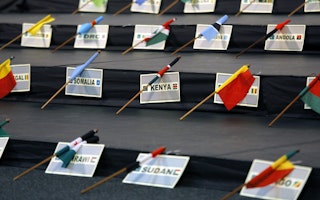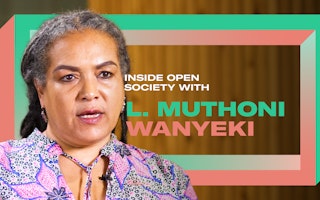Changing Global News Coverage of Africa Is About Acknowledging the Continent’s Rightful Place in the World
By Ruth Omondi

A new Global Media Index for Africa—recently launched by Africa No Filter, an Open Society Foundations grantee, the Africa Center, and the University of Cape Town—sheds light on the global news media reporting on Africa. The index assessed and ranked online news stories by a range of outlets—European, American, Chinese, and Russian—which revealed much of the global media continues with a stereotypical portrayal of Africa. The findings suggested that the global media maintained the centuries-long colonial representation of Africa as a crisis-laden continent, despite recent positive developments. The media coverage is often shaped by limited knowledge of African geopolitical factors and journalistic norms that favor certain news values.
The index reviewed the performance of more than 1,000 news articles across the online news content from 20 media outlets. The review, collected over a six-month period, categorized the overall performance as medium, implying that there is still a need to significantly improve coverage on Africa in terms of more progressive narratives. The ranking of the news outlets was based on indicators such as the diversity of topics covered, sources interviewed and quoted, the number of African countries covered, and the depth of coverage—including balance, context, and stereotype avoidance.
The Guardian took first place for its overall coverage of the continent, followed by France’s Agence France-Presse and Al-Jazeera. The United States’ news giants—the Washington Post, the New York Times, and the Wall Street Journal— ranked lowest in the bottom three positions. China’s CGTN and Xinhua had mixed results, despite Beijing’s drive to expand access to its news services in Africa since the opening of its CGTN news hub in Nairobi in 2012.
The findings of this index are crucial to igniting a much-needed larger conversation on how the global news media perpetuates negative stereotypes about Africa, their negative impacts, and how to fix them. Moky Makura, executive director at Africa No Filter, whose mission is to shift these stereotypical narratives about Africa, notes that “Africans can’t ignore the outsized influence these global media outlets have on how the world sees Africa and how Africa sees itself. It’s in our interests as concerned Africans to track and monitor what and how they write about us.”
Africa has predominantly been portrayed as a “dark continent” characterized by wars, famine, poverty, disease, and corruption—painting a picture of a continent perpetually in crisis. This negative portrayal of Africa in the global media ignores the social, political, and economic success stories as well as the innovation and overall progress that has been happening over the decades.
While it is true that Africa faces significant challenges, so do other continents. Yet, compared to Africa, where the reporting is dominated by crises, the coverage of other regions does not usually define them solely by their challenges. This skewed portrayal of Africa as a continent perpetually in crisis not only misrepresents the continent but also reinforces harmful stereotypes that hinder Africa’s perception on the global stage.
Like other regions, Africa, too, should have the same nuanced and comprehensive media coverage that acknowledges its diversity, complexity, progress, and potential.
In essence, the index echoes decades-long findings of several research studies on perpetual negative reporting on Africa and the calls for global news media to provide more balanced and accurate reporting.
One way to achieve this is by amplifying African voices to tell Africa’s story and partnering with organizations like the African News Agency and platforms like the African News and AllAfrica to provide Africa-centric perspectives. Fostering partnerships with African outlets and investing in more correspondents on the ground to report on a wide range of issues and offer deeper insights and contextual nuances is important.
Ultimately, changing Africa’s global news coverage is not just about balance and fairness; it’s about acknowledging Africa’s rightful place in the world. It’s about recognizing that Africa is not just a sum total of its problems but a continent of immense opportunities and diversity, with many stories of triumph, progress, and innovation that deserve to be told alongside its struggles.
In the end, it’s about telling Africa’s full story—the story of a vibrant, dynamic, and evolving continent.
Ruth Omondi is an associate director for Communications at the Open Society Foundations.


